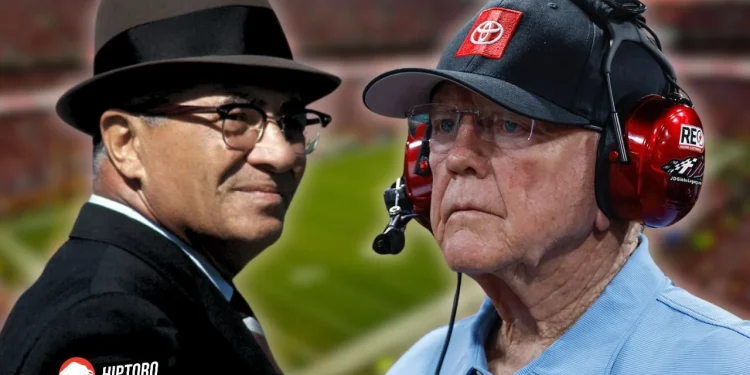The National Football League (NFL) has been the stage for numerous iconic figures, but few have shaped the game as profoundly as its greatest coaches. These master tacticians have not only led teams to championships but have also innovated and influenced the sport in enduring ways. In this exploration, we delve into the legacies of the top ten greatest coaches in NFL history, examining their strategies, leadership qualities, and the indelible marks they have left on the league.
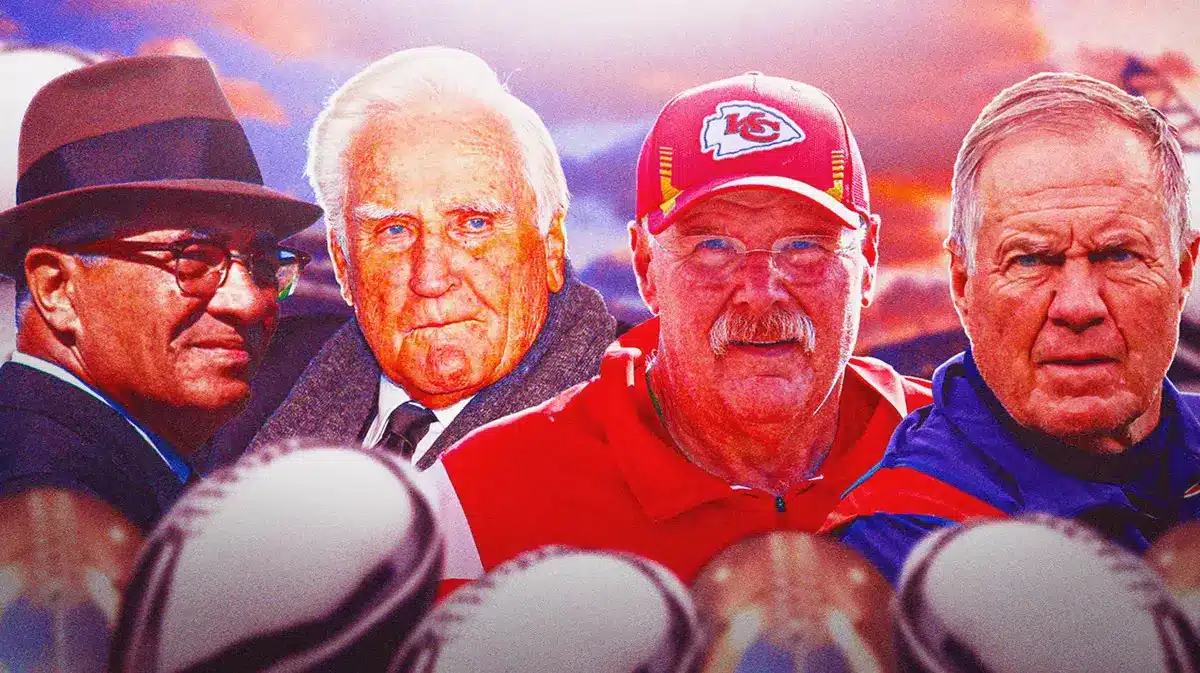
From pioneering formations to instilling unmatched discipline and resilience in their teams, these coaches have redefined success in the NFL. Their achievements are measured not just in wins and losses but in the impact they’ve had on players and the broader coaching fraternity. As we chart their careers and contributions, it becomes clear why these individuals are revered across generations and continue to be benchmarks of excellence in the world of professional football.
Here are the Top 10 Greatest Coaches in NFL History
1. Vince Lombardi
Vince Lombardi is often the first name that comes to mind when discussing the greatest NFL coaches. His tenure with the Green Bay Packers during the 1960s is legendary, leading the team to five NFL championships, including the first two Super Bowls. Lombardi was known for his rigorous discipline, attention to detail, and relentless pursuit of perfection. His famous “Lombardi Sweep” is still cited in discussions about effective football strategies. Lombardi’s leadership extended beyond the gridiron; his commitment to equality and justice, particularly in the integration of Black players into the NFL, set a standard for how coaches could influence off-field issues.
Vince Lombardi’s coaching style is iconic in NFL history, embodying the epitome of leadership, discipline, and the relentless pursuit of success. As the head coach of the Green Bay Packers from 1959 to 1967, Lombardi’s approach was rooted in the fundamental belief that winning isn’t everything; it’s the only thing. This philosophy drove every aspect of his coaching, influencing his interactions with players, his game preparations, and his overall strategy.

Lombardi’s coaching style was characterized by an unwavering demand for perfection and a strict discipline that he applied uniformly to every player, regardless of their status. His training sessions were grueling, focusing on the basics of the game to ensure that every player mastered the essential skills. He was particularly famous for his attention to detail, often drilling players on specific plays until they could execute them flawlessly under any condition.
One of Lombardi’s most significant contributions to NFL strategy was the development of the “Lombardi Sweep,” a play that became a staple in the Packers’ offensive playbook. This play perfectly exemplified his coaching philosophy. It involved multiple players, required precise execution, and relied on the collective effort of the offensive line and the running backs. The success of the Lombardi Sweep demonstrated the effectiveness of his emphasis on teamwork and meticulous preparation.
Beyond the technical aspects of football, Lombardi was a motivational mastermind. His speeches and one-liners, filled with compelling messages about the importance of effort, sacrifice, and willpower, resonated deeply with his players. He had a unique ability to inspire and extract the best out of his team, which was evident in the Packers’ numerous come-from-behind victories.
Lombardi also left a lasting impact off the field. His leadership extended into player welfare, where he advocated fiercely for racial integration and equality in the sport. He ensured that all players, regardless of race, were given equal opportunities and treatment, which fostered a strong sense of unity and respect within the team.
In conclusion, Vince Lombardi’s coaching legacy is monumental, not just for the championships he won but for the indelible mark he left on the NFL. His emphasis on discipline, preparation, and moral integrity set new standards in coaching, making him a true pioneer in the field
2. Bill Belichick
Bill Belichick’s name is synonymous with the modern era of the NFL, primarily due to his long-standing role as the head coach of the New England Patriots. Belichick has a record number of Super Bowl appearances as a coach and has secured six Super Bowl titles. His coaching philosophy is characterized by adaptability and a deep understanding of his opponents, often seen in his teams’ strategic game plans and adjustments. Belichick’s prowess in draft and player development has consistently kept the Patriots at the forefront of the league, making his model one of the most studied and respected in sports management.
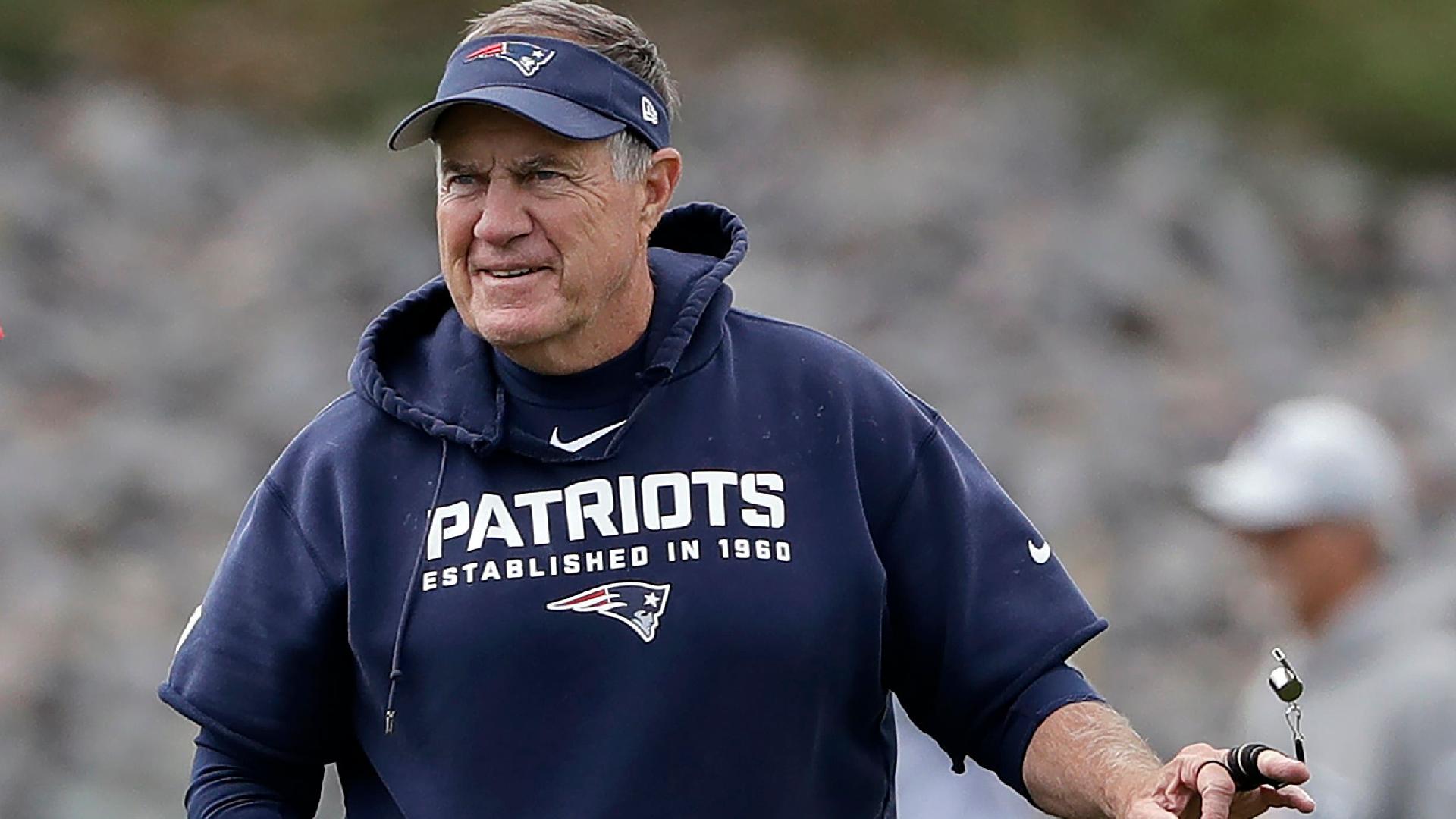
Bill Belichick, the long-standing head coach of the New England Patriots, is renowned for his strategic acumen and adaptability, which have been central to his enduring success in the NFL. With a record number of Super Bowl appearances and six championships to his name, Belichick’s coaching career is distinguished by an unparalleled understanding of the game and its nuances.
Belichick’s strategy is deeply analytical, often described as a chess match against his opponents. He is known for his detailed game preparations, where he analyzes vast amounts of data to exploit weaknesses in opposing teams. His approach to each game is tailored specifically to the strengths and vulnerabilities of his opponents, showcasing his adaptability and tactical intelligence.
In sum, Bill Belichick’s approach to NFL coaching is a blend of meticulous preparation, strategic flexibility, and a profound understanding of football. His continuous adaptation and innovative strategies have not only defined his legendary career but have also had a lasting influence on the sport itself.
3. Don Shula
Don Shula holds the record for the most wins by an NFL head coach, a testament to his longevity and consistent success in the league. Coaching the Miami Dolphins, Shula led the only perfect season in NFL history in 1972.
His teams appeared in six Super Bowls, capturing two titles. Shula was known for his offensive ingenuity and the ability to adapt his coaching style to the strengths of his players. Under his guidance, the Dolphins were a powerhouse in the 1970s, and his influence is still felt in the coaching strategies employed across the NFL today.
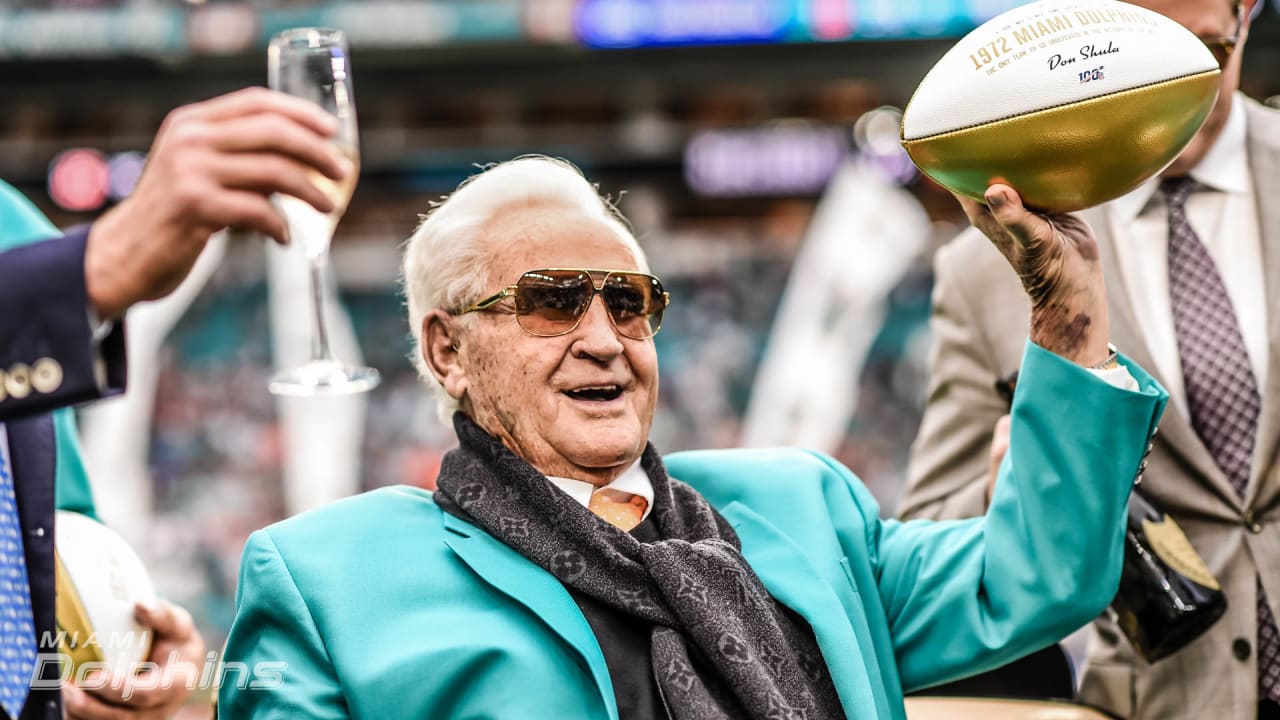
Don Shula’s coaching career, particularly with the Miami Dolphins, is marked by his incredible adaptability and innovative strategies. Shula holds the record for the most wins by an NFL head coach, a testament to his consistent ability to keep his teams performing at their peak over a long and storied career. His 1972 Dolphins team remains the only one in NFL history to finish a season undefeated, a crowning achievement that underscores his tactical genius and leadership.
Shula’s adaptability was evident in his ability to coach successfully across different eras of the NFL, with varying player rosters and against evolving strategies. He was known for his flexible coaching style, which allowed him to tailor his approach to maximize the strengths and minimize the weaknesses of his teams. This trait was crucial in maintaining his team’s competitive edge, regardless of the changing dynamics of the league.
In conclusion, Don Shula’s legacy in the NFL is defined not just by his record number of wins but also by his innovative approaches and adaptability to the evolving game. His ability to build and rebuild competitive teams across different eras speaks volumes about his understanding of football and his acumen as a coach.
4. George Halas
A founding titan of the NFL, George Halas, also known as “Papa Bear,” was the owner and coach of the Chicago Bears for over four decades. His contributions to the NFL are immeasurable, not only in terms of coaching victories but also in shaping the league’s structure and future.
Halas led the Bears to six NFL championships and was a pioneer in both offensive and defensive systems. His commitment to innovation included the early adoption of film studies to analyze games and improve player performance, setting a precedent that would become a staple in sports.
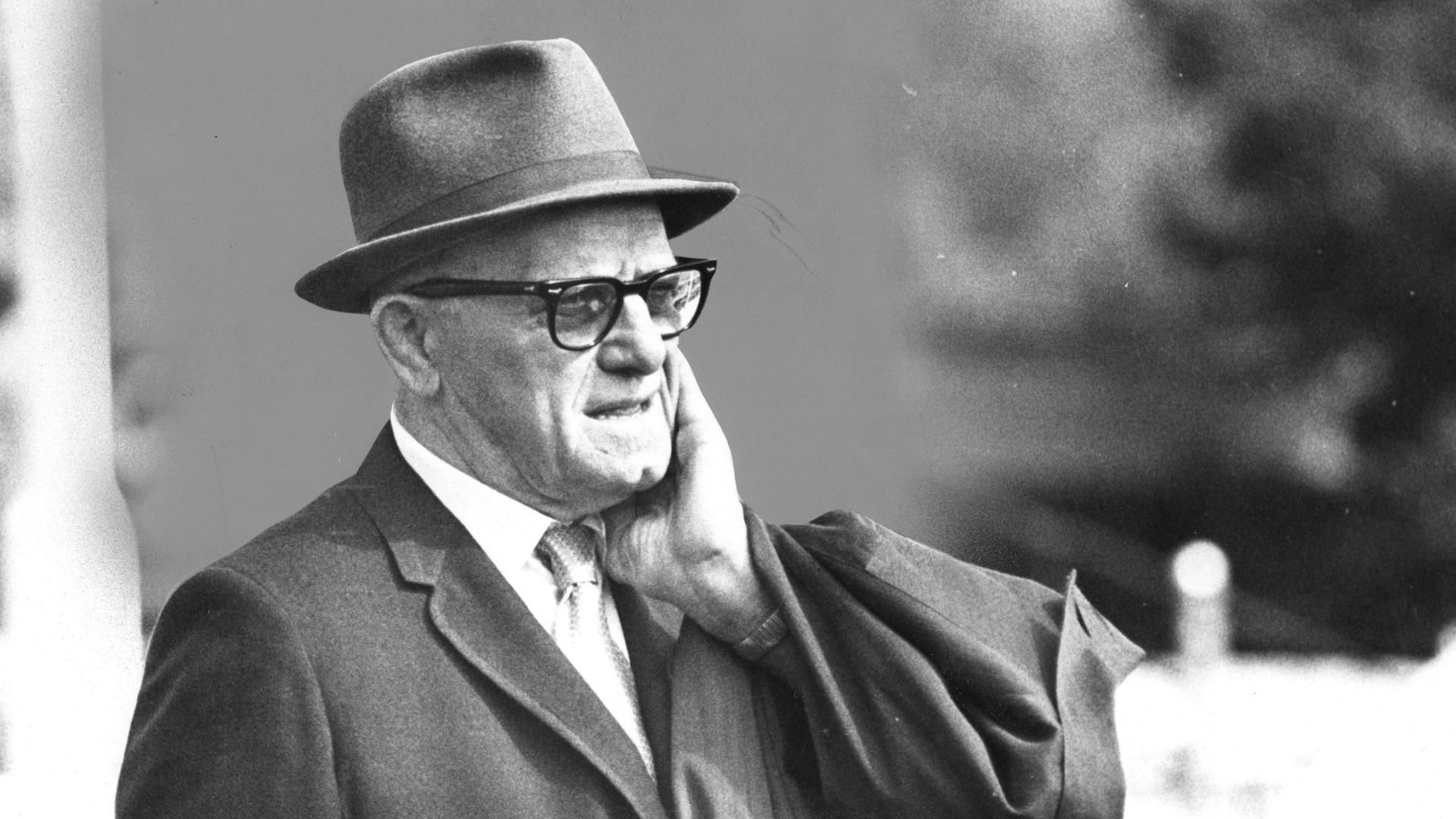
George Halas, affectionately known as “Papa Bear,” was not only a founder of the NFL but also one of its most influential coaches. His tenure with the Chicago Bears spanned over four decades, during which he left an indelible mark on the sport. Halas won six NFL championships, a testament to his enduring success and innovative approach to the game of football.
Halas was a true pioneer in several aspects of football coaching and management. He was among the first to recognize the importance of film study, breaking down game footage to gain insights into opponent tendencies and to improve player performance. This practice, revolutionary at the time, has since become a standard part of any professional football team’s preparation.
In conclusion, George Halas’s contributions to the NFL were profound and multifaceted. As a coach, innovator, and leader, he played a crucial role in shaping the league and the sport of football. His pioneering spirit and lasting impact on the game cement his legacy as one of the greatest coaches in NFL history.
5. Chuck Noll
Chuck Noll transformed the Pittsburgh Steelers from perennial underdogs into one of the most formidable dynasties in NFL history. Under Noll’s leadership, the Steelers claimed four Super Bowl titles in six years during the 1970s. His coaching philosophy emphasized fundamental football and mental toughness, which became the hallmarks of the Steelers’ “Steel Curtain” defense. Noll was also instrumental in scouting and developing talent, drafting numerous future Hall of Famers like Terry Bradshaw, Joe Greene, and Franco Harris. His legacy is not just in the trophies and records but in the culture of excellence and resilience he instilled in his team.

Chuck Noll, the head coach of the Pittsburgh Steelers from 1969 to 1991, built one of the most formidable dynasties in NFL history. Under his guidance, the Steelers won four Super Bowl titles in the 1970s, a period dominated by Noll’s strong leadership and innovative coaching strategies. His philosophy was simple yet profound: teach fundamentals, focus on execution, and treat each player as an individual capable of contributing to the team’s success.
In conclusion, Chuck Noll’s impact on the NFL and the Pittsburgh Steelers is immeasurable. His emphasis on fundamentals, strategic acumen in the draft, and strong ethical leadership created a legacy of excellence that transformed the Steelers into one of the most respected franchises in sports history.
6. Paul Brown
Paul Brown is often credited as the man who brought method and science to coaching. As the founder and coach of the Cleveland Browns, and later the Cincinnati Bengals, Brown introduced numerous innovations that are now standard in football, including the use of game film to scout opponents, the establishment of a playbook, and the development of the modern face mask. His influence extended beyond his teams; his disciples, such as Bill Walsh and Don Shula, went on to become legendary figures themselves. Brown’s approach to game preparation and player evaluation forever changed how coaching was approached in the NFL.

Paul Brown’s name is synonymous with innovation in the NFL. As the founder and coach of the Cleveland Browns, and later the Cincinnati Bengals, Brown introduced numerous techniques and strategies that have become standard in modern football. His influence extends beyond his teams, with his philosophies impacting the entire league and shaping the future of the sport.
Brown was the first coach to use game film to scout opponents and instruct his players, a practice now universal in the sport. He was also a pioneer in developing a systematized playbook, which he used to ensure that all team members were on the same page and could execute their roles effectively. This approach not only improved player performance but also revolutionized how teams prepared for games.
In conclusion, Paul Brown’s revolutionary impact on the NFL is profound. His forward-thinking approach to coaching, game preparation, and player safety left an indelible mark on the sport, making him one of the most influential figures in the history of football.
7. Bill Walsh
Bill Walsh, famously known as “The Genius,” revolutionized football with his creation of the West Coast Offense, a strategy emphasizing short, horizontal passing routes to control the game.
As the head coach of the San Francisco 49ers, Walsh won three Super Bowl titles and his offensive philosophy continues to influence the NFL profoundly.
Walsh’s teams were known for their precision and efficiency, qualities he instilled through meticulous preparation and innovative practice techniques. Beyond his schematic contributions, Walsh’s legacy includes his commitment to diversity in coaching, paving the way for a more inclusive approach in hiring practices across the league.

Bill Walsh, known affectionately as “The Genius” in NFL circles, transformed the game of football with his innovative approach and strategic mind. As the head coach of the San Francisco 49ers, Walsh won three Super Bowl titles and developed the West Coast Offense, an offensive strategy that revolutionized football and remains influential to this day.
The West Coast Offense, characterized by its short, horizontal passing game, was designed to replace traditional, riskier downfield passes with shorter, high-percentage throws. This approach allowed for greater control over the ball and helped to maintain offensive momentum. Walsh’s system emphasized timing, precision, and the spatial distribution of players, which often confused and outmaneuvered defenses.
In conclusion, Bill Walsh’s contributions to NFL coaching are monumental. His strategic innovations, focus on player development and commitment to diversity have left a lasting legacy that continues to influence the sport today.
8. Tom Landry
Tom Landry’s tenure with the Dallas Cowboys is one of the most storied in NFL history. Landry led the Cowboys to two Super Bowl victories and holds the record for the most consecutive winning seasons, which speaks volumes about his consistency and adaptability.
Known for his stoic demeanor and innovative strategies, Landry pioneered the use of the “Flex Defense” system and was among the first to utilize computerized scouting and game simulations. His methodical approach to the game made the Cowboys a dominant force in the NFL and his influence is still seen in the tactical approaches of modern coaches.

Tom Landry is a legendary figure in NFL history, renowned for his 29-year tenure as the head coach of the Dallas Cowboys. Landry’s systematic approach to coaching and his innovations in both offensive and defensive strategies left a lasting mark on the league.
Landry was the architect of the 4-3 defense and the Flex Defense system, which added a level of strategic depth to the defensive play that was previously unseen in the NFL. His defensive formations were designed to counter specific offensive strategies and adapt to in-game situations, showcasing his tactical flexibility and deep understanding of the game.
In conclusion, Tom Landry’s legacy as a coach is defined by his innovative strategies, his systematic approach to the game, and his ability to adapt and evolve with the sport. His contributions to football have made him one of the greatest coaches in NFL history.
9. Joe Gibbs
Joe Gibbs is unique in that he led the Washington Redskins to three Super Bowl victories with three different quarterbacks, a testament to his coaching adaptability and prowess. Gibbs excelled in tailoring his strategies to the strengths of his players and circumstances, rather than adhering to a single system.
His ability to adjust and innovate under pressure was highlighted by his teams’ performances in critical playoff games. Off the field, Gibbs was known for his leadership and integrity, qualities that inspired loyalty and peak performance from his players.

Joe Gibbs is renowned in NFL history for his remarkable adaptability and strategic acumen, leading the Washington Redskins to three Super Bowl victories with three different quarterbacks—an unparalleled feat that underscores his coaching prowess.
Gibbs’ ability to adapt his strategies based on the strengths and weaknesses of his players was key to his success. He was not tied to a single system; instead, he tailored his approach to maximize his team’s effectiveness, demonstrating a flexible and responsive coaching style. This adaptability was most evident in his offensive schemes, which were adjusted to accommodate the particular skills of his quarterbacks and key offensive players.
In conclusion, Joe Gibbs’ coaching career is marked by his strategic flexibility, innovative tactics, and strong leadership qualities. His ability to adapt and succeed in various circumstances has cemented his status as one of the greatest coaches in NFL history.
10. Chuck Pardee
Chuck Pardee’s coaching career is noteworthy for his success across multiple levels of football, including the NFL, where he left a significant mark with the Chicago Bears and the Washington Redskins.
Known for his defensive acumen, Pardee’s teams were tough and competitive, often outperforming expectations. His emphasis on defense and special teams made his teams difficult to beat and often placed them in playoff contention. Pardee’s ability to inspire and motivate his players to achieve their best was one of his most enduring qualities, making him a respected figure in NFL coaching circles.

Chuck Pardee, often remembered for his tenures with the Chicago Bears and the Washington Redskins, was a coach who made significant contributions to NFL defenses. His strategies and defensive schemes played a critical role in shaping the teams he coached, making them tough competitors in the league.
Pardee’s approach to defense was characterized by aggression and flexibility. He was adept at adjusting his defensive strategies to exploit the weaknesses of opposing offenses, often employing complex blitzes and coverages that confused and overwhelmed quarterbacks and offensive coordinators.
In conclusion, Chuck Pardee’s impact on football as a coach was significant, particularly in the area of defensive football. His innovative strategies and strong leadership helped to define the defensive identity of the teams he coached, leaving a lasting legacy in the league.
The NFL has been shaped significantly by the contributions of its greatest coaches. These men not only led their teams to victories and championships but also introduced innovations that have permanently influenced how the game is played and coached. Their legacies are not just about the records they set or the titles they won but also about the impact they had on their players and the game itself.
Each coach brought a unique style and philosophy to the sport, making them not just architects of their teams but also pioneers who helped evolve the NFL into what it is today. As the league continues to grow and change, the lessons and strategies of these top ten coaches will undoubtedly remain a fundamental part of NFL lore.


